“Images from the far past crowd my head and half the time I cannot tell whether they are memories or inventions. Not that there is much difference between the two, if indeed there is any difference at all. Some say that without realizing it we make it all up as we go along, embroidering and embellishing, and I am inclined to credit it, for Madam Memory is a great and subtle dissembler.”—Alexander Cleave
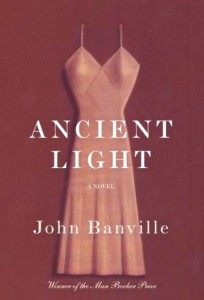 Author John Banville has always specialized in short, dense novels in which his narrators are unreliable, even dishonest, often pretending to be different from what they really are as they deal with turning points in their lives. The Book Evidence (1989) is a monologue by a man confessing to a murder, though the reader does not know how much of the confession, which focuses on his life, rather than his crime of the moment, is really true. In The Untouchable (1997), Banville’s narrator, Victor Maskell, is a thinly disguised story of Anthony Blunt, who, with several other Cambridge friends, led a hidden life as a spy for Russia during the thirties and forties. In Eclipse (2000), the first of the Cleave trilogy, Banville’s narrator is Alexander Cleave, a stage actor who has “dried” onstage and who has returned to his childhood home to relive memories and try to come to terms with the inner self which has betrayed him onstage. Shroud (2002) tells us the story of the missing Cass Cleave, Alexander’s daughter, told from the point of view of Axel Vander, a mysterious man who traveled with her to Italy, though Alexander Cleave does not know this. Vander, too
Author John Banville has always specialized in short, dense novels in which his narrators are unreliable, even dishonest, often pretending to be different from what they really are as they deal with turning points in their lives. The Book Evidence (1989) is a monologue by a man confessing to a murder, though the reader does not know how much of the confession, which focuses on his life, rather than his crime of the moment, is really true. In The Untouchable (1997), Banville’s narrator, Victor Maskell, is a thinly disguised story of Anthony Blunt, who, with several other Cambridge friends, led a hidden life as a spy for Russia during the thirties and forties. In Eclipse (2000), the first of the Cleave trilogy, Banville’s narrator is Alexander Cleave, a stage actor who has “dried” onstage and who has returned to his childhood home to relive memories and try to come to terms with the inner self which has betrayed him onstage. Shroud (2002) tells us the story of the missing Cass Cleave, Alexander’s daughter, told from the point of view of Axel Vander, a mysterious man who traveled with her to Italy, though Alexander Cleave does not know this. Vander, too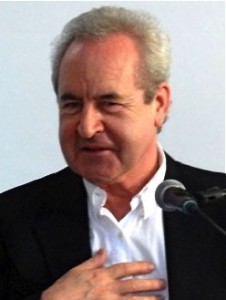 , is not the person he says he is: “Mendacity is second, no, is first nature to me,” he says. In every case, these characters see themselves differently from what they really are, and as they remember and talk about the past, it is at least as much invented as it is real, leading the reader to contemplate how, in fact, we all interpret reality: once an event occurs, our only way of revisiting it is through memory, and we often have subconscious reasons for remaking our memories into stories which may differ from actual reality.
, is not the person he says he is: “Mendacity is second, no, is first nature to me,” he says. In every case, these characters see themselves differently from what they really are, and as they remember and talk about the past, it is at least as much invented as it is real, leading the reader to contemplate how, in fact, we all interpret reality: once an event occurs, our only way of revisiting it is through memory, and we often have subconscious reasons for remaking our memories into stories which may differ from actual reality.
Now, in Ancient Light, the final novel of the trilogy involving Alexander Cleave, Cass Cleave, and Axel Vander, John Banville brings the arc of his plot to its conclusion, both in terms of story and in terms of theme. Here, sixty-five-year-old Cleave and his wife Lydia (whose name is really Leah) are still mourning the death of their pregnant daughter Cass, who died ten years ago. Lydia has full-fledged night-time rampages in which she panics, convinced that Cass is still alive in the house somewhere, while Cleave, sometimes has strange dreams and “manifestations.” Their dreams are always a combination of reality and memory, presented in new forms through the kind of invention which comes through troubled sleep.
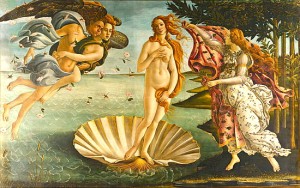 A former stage actor whose career is in decline, Cleave spends much of his time in an “attic aerie” musing about the past while writing a memoir about an affair he had fifty years ago with Celia Gray, the mother of his best friend, when he was only fifteen and she, thirty-five. “There was no moment of blinding illumination when Mrs. Gray herself stepped forth from the toils and trammels of domesticity and came skimming towards me on her half-shell, wafted by the full-cheeked zephyrs of spring. Even after we had been going to bed together for some time I would have been hard put to give a fair description of her…when I looked at her it was me that I saw first, reflected in the glorious mirror that I made of her.” His memories of Mrs. Gray, still so vivid and so exciting, dominate much of Cleave’s inner life, and as he describes this affair, his life as a teenager becomes vibrant and understandable within the context of the 1950s in which it took place. He is often convinced of the accuracy of these memories, though the reader may be unsure: Cleave is constantly getting confused about the seasons in which certain events have taken place, and he himself recognizes and admits that some of his memories could be false.
A former stage actor whose career is in decline, Cleave spends much of his time in an “attic aerie” musing about the past while writing a memoir about an affair he had fifty years ago with Celia Gray, the mother of his best friend, when he was only fifteen and she, thirty-five. “There was no moment of blinding illumination when Mrs. Gray herself stepped forth from the toils and trammels of domesticity and came skimming towards me on her half-shell, wafted by the full-cheeked zephyrs of spring. Even after we had been going to bed together for some time I would have been hard put to give a fair description of her…when I looked at her it was me that I saw first, reflected in the glorious mirror that I made of her.” His memories of Mrs. Gray, still so vivid and so exciting, dominate much of Cleave’s inner life, and as he describes this affair, his life as a teenager becomes vibrant and understandable within the context of the 1950s in which it took place. He is often convinced of the accuracy of these memories, though the reader may be unsure: Cleave is constantly getting confused about the seasons in which certain events have taken place, and he himself recognizes and admits that some of his memories could be false.
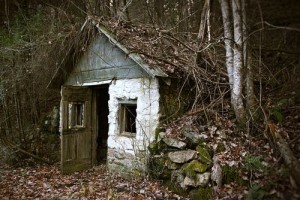
Abandoned cottage, similar to where Alex met Mrs. Gray for five months
The turning point in Cleave’s life occurs when a phone call interrupts his reverie one morning, and he is surprised to learn that a production company in California has selected him to play the role of Axel Vander, literary critic and philosopher, whose specialty is in “deconstruction.” The filming will start immediately. Cleave tells the publicist that he has never heard of Axel Vander before, but the publicist brushes this aside “with a dry laugh, I do not know why.” Readers of Banville’s Shroud know, however, that Vander was with Cass when she disappeared in Italy, lending ominous prescience to the events that might be about to unfold for Cleave. The new film, to be called The Invention of the Past, will also star the emotionally fragile Dawn Devonport. “She was Cora, Vander’s girl, and I was Vander.”
With its parallel narratives of Cleave as a young man having an affair with Mrs. Gray, his best friend’s mother, and Cleave as a sixty-five-year-old actor trying to save Dawn Devonport, the reader is kept totally engaged with two vibrant stories filled with excitement, yet the scenes and events constantly suggest that there is more underlying the action than meets the eye. The res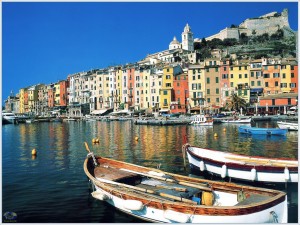 ult is thrilling, with the reader willingly assuming the roles of both detective and psychologist, analyzing the details, and finding the answers all related thematically, all part of a trilogy, every detail on every level connected to every other detail. In a sense, too, Banville also capitalizes on his readers’ own memories of the events of the previous novels in the trilogy, Eclipse and Shroud, raising questions about how much we remember of those plots and how much we may be embroidering our memories to give a sense of completion to the trilogy.
ult is thrilling, with the reader willingly assuming the roles of both detective and psychologist, analyzing the details, and finding the answers all related thematically, all part of a trilogy, every detail on every level connected to every other detail. In a sense, too, Banville also capitalizes on his readers’ own memories of the events of the previous novels in the trilogy, Eclipse and Shroud, raising questions about how much we remember of those plots and how much we may be embroidering our memories to give a sense of completion to the trilogy.
Writing in a surprisingly relaxed style, Banville creates prose so elegant, smooth, and evocative, both in ideas and images, that on every level the book is completely engrossing. Much of the novel contains humor and a great deal of dramatic irony, adding to the pleasure. And surely, every reader will become haunted by the similarities of names: Alexander Cleave is almost an anagram for Axel Vander, raising another whole set of tantalizing connections, even as the motif of Svidrigailov (an evil character from Crime and Punishment) is mentioned symbolically in both Shroud and in Cass’s diary in this novel. The ending brings all the themes full-circle, and while some may accuse the author of falling prey to the convenience of a tour de force, it is absolutely perfect in its details, thematically. Stunning as a stand-alone, Ancient Light is even better as part of a trilogy. Book clubs should find it especially fertile ground for discussion.
ALSO reviewed here: APRIL IN SPAIN, THE UNTOUCHABLE, THE INFINITIES, THE SEA (Booker Prize), SHROUD
Photos, in order: The author’s photo is from http://www.thedailybeast.com
The Botticelli Venus is fron http://en.wikipedia.org
The abandoned cottage, perhaps similar to where Alex regularly met Mrs. Gray, may be found on http://imgfave.com
Portonovere, where Cass died, and to which Alex and Dawn go during a break from filming, is seen on http://www.timeaway.co.uk
